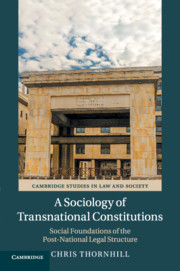Book contents
- A Sociology of Transnational Constitutions
- Cambridge Studies in Law and Society
- A Sociology of Transnational Constitutions
- Copyright page
- Dedication
- Contents
- Acknowledgements
- Citing this work
- Introduction
- Chapter One The national political system and the classical constitutional formula
- Chapter Two Constitutional rights and the global political system
- Chapter Three The constitution of international law: A sociological approach
- Chapter Four The crisis of social inclusion and the paradox of the nation state
- Chapter Five Constitutional rights and the inclusion of the nation: Systemic transformations I
- Chapter Six Constitutional rights and the inclusion of the nation: Systemic transformations II
- Chapter Seven The autonomy of the post-national legal structure: The auto-constituent constitution
- Conclusion
- Bibliography
- Index
- Cambridge Studies in Law and Society
- References
Bibliography
Published online by Cambridge University Press: 26 July 2016
- A Sociology of Transnational Constitutions
- Cambridge Studies in Law and Society
- A Sociology of Transnational Constitutions
- Copyright page
- Dedication
- Contents
- Acknowledgements
- Citing this work
- Introduction
- Chapter One The national political system and the classical constitutional formula
- Chapter Two Constitutional rights and the global political system
- Chapter Three The constitution of international law: A sociological approach
- Chapter Four The crisis of social inclusion and the paradox of the nation state
- Chapter Five Constitutional rights and the inclusion of the nation: Systemic transformations I
- Chapter Six Constitutional rights and the inclusion of the nation: Systemic transformations II
- Chapter Seven The autonomy of the post-national legal structure: The auto-constituent constitution
- Conclusion
- Bibliography
- Index
- Cambridge Studies in Law and Society
- References
Summary
- Type
- Chapter
- Information
- A Sociology of Transnational ConstitutionsSocial Foundations of the Post-National Legal Structure, pp. 430 - 505Publisher: Cambridge University PressPrint publication year: 2016
- Creative Commons
- This content is Open Access and distributed under the terms of the Creative Commons Attribution licence CC-BY-NC 4.0 https://creativecommons.org/cclicenses/



